|
It's funny how we seem to be programmed to be frightened by only one major threat to our existence at a time. For some while after the attack on the Twin Towers in New York, everyone was so focussed on the non-specific danger posed by terrorism that a small bomb on a vehicle suddenly felt far more threatening than the imposing arsenal of nuclear weapons still pointed at us from various corners of the globe. Then we all stopped worrying about that for a while because swine flu was out to get us and words like pandemic gave the tabloids something to splash in large letters across the front page.
But back in the late 60s it was the threat of nuclear war that gave us the heebie-jeebies. That the feared war never happened has regularly been quoted by the pro-nuclear lobby as evidence of its effectiveness of such apocalyptic weapons as a deterrent, while for the rest of us it was more a matter of good fortune than design, a small miracle of narrowly avoided close calls. But the weapons are still out there and worming their way back into the public conscience, as North Korea have got politicians everywhere jumping around at the prospect of what this could mean for the established power balance.
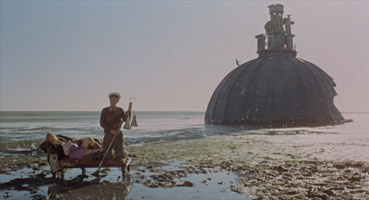
A key aspect of what remains so terrifying about such global threats is our perceived inability to do anything to prevent or even divert them. They're out of our hands and are something that will be done to us rather than by us, about which we can legitimately complain that we've done nothing to deserve. I've no doubt this very argument is being used by western governments to justify the increasingly draconian restrictions on personal freedom that we are currently witnessing, a rise of the police state dressed in the more palatable clothing of terrorism prevention. The western response to the perceived Soviet nuclear threat back in the 50s and 60s was similarly negative – if they have a thousand weapons pointed at us then we need a thousand and one pointing back at them. It was and still is known as MAD, a most appropriate acronym for Mutually Assured Destruction – they won't launch their missiles at us because we'd launch as many back at them and then they'd also be wiped out. It's an argument that I'm sure was not lost on the present North Korean government when they carried out their most recent underground nuclear test and missile launches.
In the 60s and 70s, those opposed to what had become known as the arms race began to publicly protest, both to make governments aware of the scale and strength of their views and to highlight the issue to those who were – unconsciously or otherwise – paying it no heed. One man you'd find on the earlier demos was comedy legend Spike Milligan, who apparently used to walk and talk with none other than down-dressing Labour party leader Michael Foot. Some time later in a TV documentary portrait of Milligan, Foot remembered the days with some affection, but Milligan had become more cynical in the intervening years, claiming that he no longer cared if the world just went ahead and blew itself up. It's likely Milligan's earlier concern for the future of mankind that provided the inspirational spark for The Bed Sitting Room, a blackly comic play co-written in 1961 with John Antrobus and set in London in the aftermath of a nuclear war, which was was described by one critic as "like Samuel Beckett but with better jokes."
In some ways it's surprising that The Bed Sitting Room took so long to be turned into a film, but in others it seems a miracle that it was made at all. A fragmented and absurdist piece whose structure and content could apparently alter on the nightly whim of Milligan's improvisation, it's far from obvious feature material, even at the tail end of the 60s and in the hands of the man who had already made his mark on the decade with A Hard Day's Night and Help!. This is, after all, more a collection of encounters and incidents than a story in the traditional sense, a surrealist sketch show built around a socio-political theme, one whose characters are each symbolic of a specific social group rather than traditional audience identification figures on a hero's journey.
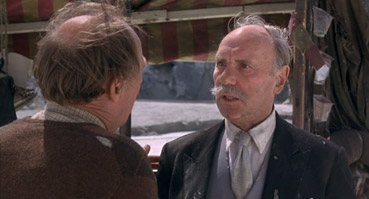
In terms of personnel, there's an underlying logic at work. Lester's association with Milligan went back to 1960 with The Running, Jumping & Standing Still Film, which Lester co-wrote with Milligan and Peter Sellers and co-directed with Sellers, with whom he'd worked previously on The Idiot Weekly, Price 2d and A Show Called Fred. And producer Oscar Lewenstein had worked with Lester in 1965 on The Knack…And How to Get It. We'll try not to read too much into the fact that The Bed Sitting Room was the first and last film made for his creatively titled Oscar Lewenstein Productions or that Oscar himself, who had also worked with such luminaries as Tony Richardson, Lindsay Anderson and Peter Brook, chose to stick with theatre after this and only executive produced one more film in his career, the great Alan Clarke's 1986 Rita, Sue and Bob Too.
So what exactly does that title mean? I'm glad you asked. A plot outline should clarify things a little, and I do mean a little. I'll be identifying the performers as I go along, as the roll call of dramatic and comedy talent assembled here is one of the things that makes The Bed Sitting Room so retrospectively fascinating.
Following the almost complete destruction of London in a brief but devastating nuclear war, a small number of survivors attempt to maintain a semblance of pre-war routine and normality. A family consisting of Father (Arthur Lowe), Mother (Mona Washbourne) and teenage daughter Penelope (Rita Tushingham) have set up home in a carriage of a still operating Circle Line tube train, their meagre food supply raided from vending machines when the train stops briefly at stations. Father appears blissfully ignorant of Penelope's pregnancy and puts her swollen belly down to all the choccy bars she's been eating. He's certainly not aware of Allan (Richard Warwick), the young man in the next carriage that Penelope's been secretly seeing for some time and the father of her child.
Above ground, meanwhile, the city's entire electricity supply is being generated by a man (Henry Woolf) on a cycle-powered generator; demonic NHS treatment is handed out by the predatory Nursy (Marty Feldman, making his feature film debut); gag mail continues to be delivered by a solitary postman (Spike Milligan); citizens are urged to keep moving by two police officials (Peter Cook and Dudley Moore) in a balloon-suspended car; and survivors are kept informed of world events by a BBC newsreader (Frank Thornton), who travels between locations and reads the news from behind broken television screens. The country is ruled by ineffective figurehead Ethel Shroake (Dandy Nichols), the only survivor with a distant royal bloodline connection, and wandering through the wasteland is Lord Fortnum of Alamein (Ralph Richardson), who early in the story pays a visit to doctor Bules Martin (Michael Horden) to express his concern that he may be mutating into a bed sitting room.
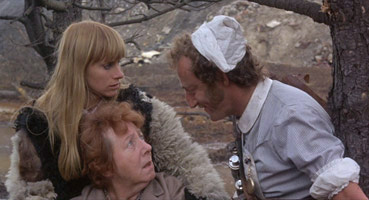
And that's just the start of it. We've yet to meet the pervy and self-stimulating Plastic Mac Man (Lester favourite Roy Kinnear), the unfortunate Nigel (Jimmy Edwards), who has been lying in the remains of a left luggage department for three years, the reality-detached representative of the armed forces (Ronald Fraser), a waterside vicar (Jack Shepherd), and a manic representative of regional government (Harry Secombe), who is holed up in a nuclear shelter and convinced he has proof of who started the war.
Once the chocolate runs out and the Circle Line family make for the surface, a roulette wheel of character interaction begins, with almost everyone encountering everyone else at one point or another. Bules Martin takes a fancy to Penelope and gets Father's permission to court her, Father himself develops ambitions to become prime minister and shows signs of turning into a parrot, and after being pronounced dead by Nursy – even though she's clearly not – Mother mutates into a wardrobe that eventually finds a home in the bed sitting room of the title.
Surrealism is the name of the game here, appropriate in a world that would be rendered genuinely surreal by its drastic physical and structural transformation. While in the play this will have been largely restricted to dialogue, incident and apparel, it's vividly realised here through David Walkins' striking cinematography and a string of extraordinary found locations, including a footwear mountain, a sea of old crockery and graveyard of derelict vehicles. The constructed elements, courtesy of production designer Assheton Gorton (who was later to work on such prestige productions as The French Lieutenant's Woman and Legend), are always memorable, from the tube escalator that emerges into devastation, to the crumbling, half-submerged remains of the dome of St. Paul's. Even the underground trains and stations have been effectively set-dressed to appear long-since abandoned by civilisation, iconic images of a once-great city that's been reduced to a wasteland.
The comedy is appropriately dark and absurdist and only intermittently seems to be trying to provoke outright laughter. The dialogue certainly provides its fair share of fun, particularly when in the hands of Horden's stumbling bluff and Richardson's dry befuddlement. Together the two are a delight, their first encounter peppered with moments to treasure, from Richardson's early-warning hat to the straight-faced delivery of Milligan-esque dialogue: "Not THE Lord Snowdon?" "No, A Lord Snowdon." "Ah yes, the woods are full of them." Mind you, Arthur Lowe proudly stating "Show me a 22 inch inside leg and I'll show you a future prime minister" has me giggling every time, and Ralph Richardson's alarmed cry of "My God, I've dropped a brick!" has stayed with me since my very first viewing (you probably have to see this one to appreciate the humour). There are also a few priceless visual gags, my favourite being the bottle that pours its contents at a peculiar angle, the explanation for which is made funnier by the illogical bemusement of the characters involved.
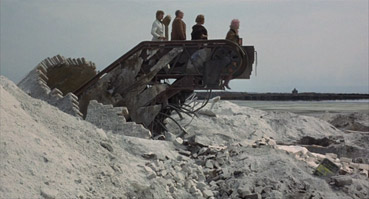
The film is also speckled with unexpectedly poignant moments, none more so than Mother's resigned acceptance of the proclamation of her death. Mona Washbourne's performance sells it, but a grim gravitas is provided by its symbolic reading, of a health service unable to offer real medical care and capable only of pronouncing patients dead before their time. It's made all the more unsettling by her family's willingness to immediately take what this demented NHS representative tells them at face value.
There's an underlying sense that humankind is not destined to survive such devastation and that we are witnessing the last mad twinkling of our species. That Lester chose not to go the whole hog and show this is actually surprising, the suggestion scaled down to a few ominous coughs, some vomiting, a dead baby, a tonal shift in the initially jolly score to more doom-laden chords, and a rash of mutations into animals and inanimate objects, one of which is destroyed by surviving authority figures.
Whether this adds up to a genuinely great movie will definitely be in the eye of the beholder, but it does make for a consistently fascinating, frequently entertaining and joyously inventive one that I, for one, am delighted to see being given the star treatment it has been accorded as part of the BFI's new Flipside strand. And it's a mark of the affection in which it is held that everyone I spoke to who was old enough to remember it, whether it be from TV or cinema screenings (I first caught it at the National Film Theatre in the late 1970s), responded very positively to the news that it was coming to DVD, their affection for it summed up by the friend who on the mere mention of the title visibly lit up and said simply, "Oh I LOVED that film!" It's a typical reaction to a work that may have be some way short of perfect, but that you can't help adoring anyway.
Falling a little short of the impossibly high standard set by the other two titles in the first wave of the BFI's new Flipside arm (London in the Raw and Primitive London), this is still a fine transfer and the best I've seen the film look outside of the cinema, although that was long enough ago to make such comparisons uncertain. Colours are strong, particularly the use of extreme red and green filtration in some scenes, and the contrast is generally good, if a tad on the heavy side at times with the subsequent loss of fine detail in darker areas. There is some visible grain and the occasional bit of flickering, and some noticeable light leakage on frame right in one short sequence. On the whole, though, a sound job, a least on DVD – not sure how this one will look on the Blu-ray.
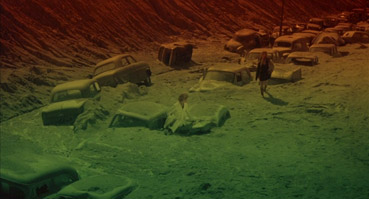
The mono 2.0 soundtrack is clean on damage and noise and displays only a slight narrowing of dynamic range.
As with the BFI's simultaneous DVD/Blu-ray release of Primitive London, the key extra features here are three interviews from the 330 recorded by Bernard Braden and Barbara Kelly for their proposed TV series Now and Then. As with the ones on that disc, the three collected here are specifically relevant to the main feature, and given their collective importance to British comedy of the period their inclusion is invaluable. All three are unedited and include clapperboards and have no introductory text.
Richard Lester Interview (1967) (17:01)
This interview with Lester was conducted shortly after the completion and premiere screenings of his 1967 film How I Won the War (it's not named in the interview itself but you can work it out from what's discussed). Wearing a serious face and coming across just occasionally as a touch self-important, Lester is nonetheless an always interesting interviewee and talks about the initial reactions to How I Won the War, Kubrick's Paths of Glory (he's not a fan), making commercials, the casting process, writing The Knack, and a then untitled project he was working on with Julie Christie, which made it to the screen as Petulia.
Spike Milligan Interview (1967) (39:38)
Braden seems determined to cut through Milligan's comic persona with a series of serious questions about socio-political issues, including patriotism, pornography, the Black Power movement, euthanasia, religion, war, his experience of being breathalysed, sexual equality, extra-marital sex, the present government and a few others. There's an underlying suspicion that Braden is trying to trip Milligan up, and just occasionally he obliges, particularly in the proclamation that women simply do not have the creative capability of men. It's a fascinating interview nonetheless, and one with surprisingly few jocular moments.
Peter Cook Interview (1967) (30:31)
A revealing and entertaining chat with a very Oxbridge sounding Cook shortly after the completion of Bedazzled, which he talks about but never names and expresses considerable satisfaction with. Questions about his work and methods (he surprisingly reveals that he is suspicious of improvisation) move onto more socio-political ones, including the untrustworthy nature of politicians, Cook's fondness for misbehaving Labour minister George Brown, his views on the Vietnam war and the Arab-Israeli conflict, and his genuine affection for his home country ("It's the best place to live."). His views on the Conservative party of the time have a contemporary ring, particularly when he notes that every time he goes off Labour he only has to think of those Tory faces and voices to put things back in perspective.
Trailer (3:06)
Old school trailer-making without the curse of machine-gun editing. Certainly would have got me interested.
There's also a fine Booklet containing a detailed essay on the film by Michael Brooke, the original MFB review by Russell Campbell, a piece on Richard Lester by Neil Sinyard, credits for the film, details of the Bernard Braden interviews and a number of quality stills.
A unique and bold adventure in black comedy that doesn't always come off but has so much that works and is so imaginative that it feels churlish to carp. It's a most legitimate inclusion in the BFI's Flipside strand, being an unfairly ignored gem of late 60s British comedy whose cast alone are a cult cinema fan's wet dream. The addition of three rare and very worthwhile interviews seals the deal. Recommended.
|